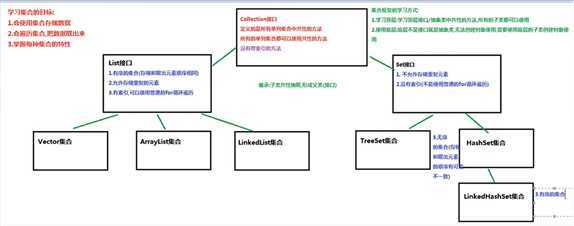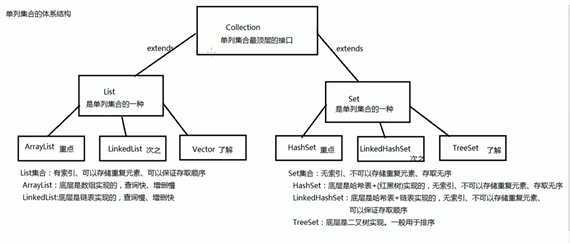集合:集合是Java中提供的一种容器,可以用来存储多个数据。
集合与数组都是容器,它们的区别是什么?
1、数组的长度是固定的,集合的长度是可变的。
2、数组中存储的是同一类型的元素,可以存储基本数据类型值。集合存储的都是对象。而且对象的类型可以不同。在开发中,一般当对象多的时候,使用集合进行存储。


boolean**** | add(E e) 确保此集合包含指定的元素(可选操作)。 |
|---|---|
boolean |
addAll(Collection c) 将指定集合中的所有元素添加到此集合(可选操作)。 |
void**** |
clear() 从此集合中删除所有元素(可选操作)。 |
boolean |
contains(Object o) 如果此集合包含指定的元素,则返回 true 。 |
boolean |
containsAll(Collection c) 如果此集合包含指定 集合中的所有元素,则返回true。 |
boolean |
equals(Object o) 将指定的对象与此集合进行比较以获得相等性。 |
int |
hashCode() 返回此集合的哈希码值。 |
boolean |
isEmpty() 如果此集合不包含元素,则返回 true 。 |
Iterator**** |
iterator() 返回此集合中的元素的迭代器。 |
default Stream |
parallelStream() 返回可能并行的 Stream与此集合作为其来源。 |
boolean |
remove(Object o) 从该集合中删除指定元素的单个实例(如果存在)(可选操作)。 |
boolean |
removeAll(Collection c) 删除指定集合中包含的所有此集合的元素(可选操作)。 |
default boolean |
removeIf(Predicate filter) 删除满足给定谓词的此集合的所有元素。 |
boolean |
retainAll(Collection c) 仅保留此集合中包含在指定集合中的元素(可选操作)。 |
int |
size() 返回此集合中的元素数。 |
default Spliterator |
spliterator() 创建一个Spliterator在这个集合中的元素。 |
default Stream |
stream() 返回以此集合作为源的顺序 Stream 。 |
Object[] |
toArray() 返回一个包含此集合中所有元素的数组。 |
T[] |
toArray(T[] a) 返回包含此集合中所有元素的数组; 返回的数组的运行时类型是指定数组的运行时类型。 |
public class MyCollection {
public static void main(String[] args) {
Collection<String> obj = new ArrayList<String>();
obj.add("111");
obj.add("222");
obj.add("333");
obj.add("444");
System.out.println(obj);
boolean remove = obj.remove("444");
System.out.println(remove);
System.out.println(obj);
?
boolean contains = obj.contains("222");
System.out.println(contains);
?
int size = obj.size();
System.out.println(size);
?
Object[] array = obj.toArray();
for (int i = 0; i < array.length; i++) {
System.out.println(array[i]);
}
?
obj.clear();
System.out.println(obj);
?
boolean empty = obj.isEmpty();
System.out.println(empty);
?
}
}
原文:https://www.cnblogs.com/lxy522/p/12815373.html